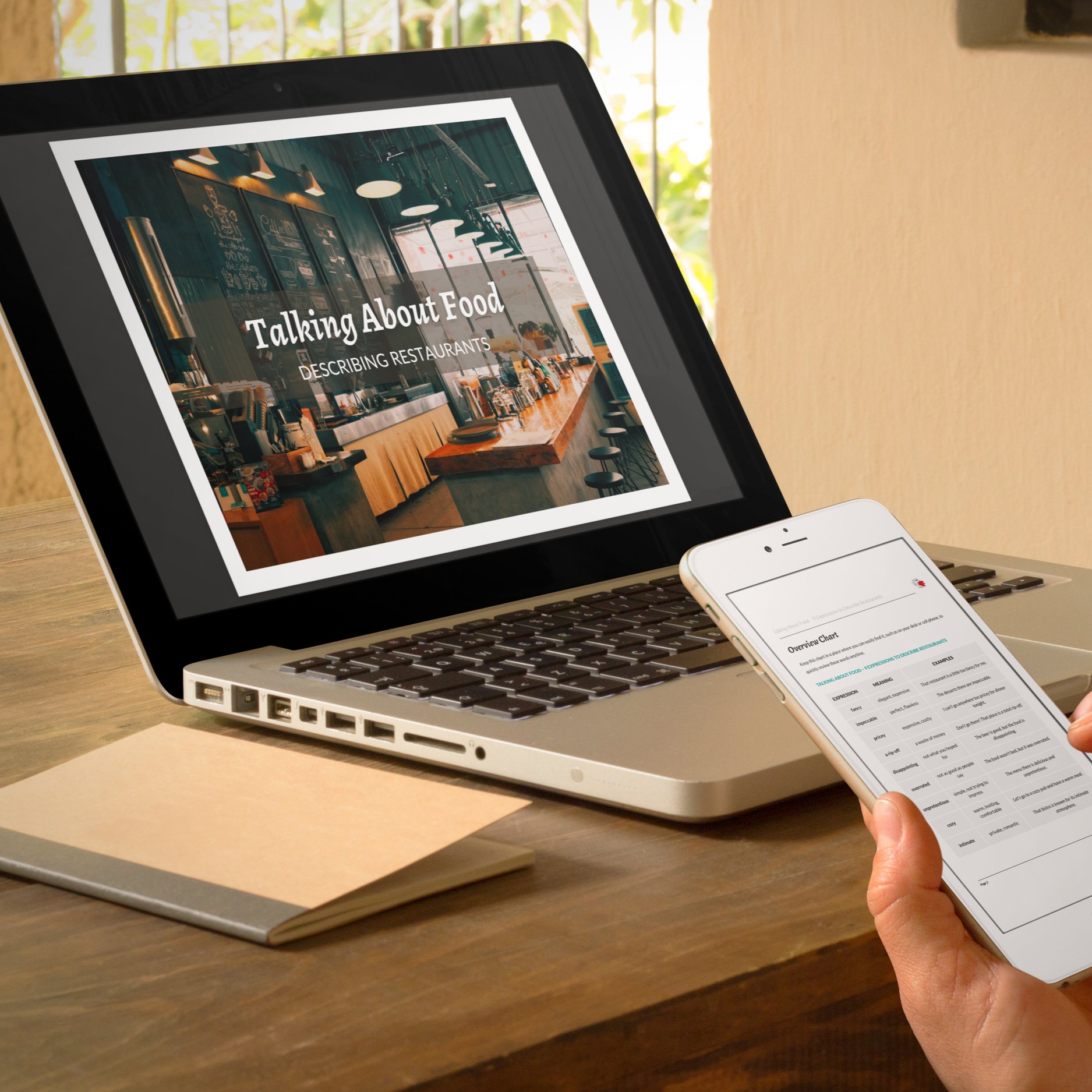7 Essential Phrasal Verbs for Everyday Life
Here’s a question I always get from my clients and readers:
“How do I know which phrasal verbs to focus on?”
Most lessons include a massive list of phrasal verbs, and that can get confusing and discouraging. This is why in this post I’m going to teach you just a few—7 phrasal verbs that are very common in the US and Canada:
Come down with
Check up on
Show up
Go/come over
End up
Figure out
Put up with
A few weeks ago, a client mentioned to me that she’d bought a book to help her learn phrasal verbs. This book included thousands of phrasal verbs, so every time she opened it to practice, she felt overwhelmed and lost all motivation.
What makes things worse is that most books don’t present the phrasal verbs in a way that makes sense. Often, they’re grouped alphabetically or by verb which makes learning them even more difficult.
If you’re struggling with phrasal verbs (or have almost given up on learning them), I want you to know: it’s NOT supposed to be this difficult.
What makes learning them possible (or impossible) are the techniques you use to learn them. I’ve covered this in another post, but let me share with you two very important points I’ve learned in my ten years of teaching English:
Our brains cannot assimilate more than 7 bits of information at a time (plus or minus 2).
Our brains need to make connections and understand relevance to learn new information.
So, it’s not that phrasal verbs are impossible to learn, or that you don’t have what it takes to learn them. It’s that the traditional ways to teach and learn phrasal verbs are ineffective. In other words, you haven’t found the best way for YOU to learn them.
You probably keep hearing that unless you practice phrasal verbs, you won’t get comfortable with using them. But finding opportunities to practice isn’t easy, especially if you don’t live in an English speaking country. And even if you do, you might be too shy to ask your friends if you could practice with them.
This presents a very frustrating challenge for English learners, and it’s exactly why I created this lesson and included a free download for you with explanations, examples, common uses and tons of exercises to help you practice.
Teaching English Just Got Just Easier!
Save hours of time with an organized collection of high quality, easy-prep ESL lesson plans and worksheets right at your fingertips.
7 common phrasal verbs in North America
1. Come down with
To come down with something is to start to suffer from a mild illness. You might feel like you’re coming down with something if you’re about to catch a cold. So, if you’re feeling tired and achy you could say:
“I think I’m coming down with something.” or,
“I think I’m coming down with a cold.”
2. Check up on
To check up on someone is to investigate their work. Your boss might check up on your work to see if it’s done properly.
But you can also check up on a friend or a family member to see if they’re feeling well. So, in casual contexts, you can use this phrase when you want to ask a friend if they’re feeling okay. Let’s say someone close to you hasn’t been feeling well lately, then you could say:
“Hey! Just wanted to check up on you. Are you feeling any better?”
3. Show up
To show up somewhere is to be present at a place where someone is waiting for you. You might show up early or late to a meeting, and your boss will be glad if you show up to work on time every day.
If you’re at a popular concert, thousands of people might show up. And if you had a plan to meet someone and they never made it, you could say:
“They never showed up!”
Common structures
Show up + for → He showed up late for the meeting.
Show up + to → He showed up late to the meeting.
Show up + in → You can’t show up in jeans. It’s a formal event.
4. Go/come over
To come or go over is to visit someone in their house. If you’re home and waiting for a friend, you might say:
“A friend is coming over tonight.”
But if you’re on your way to your friend’s house, you could say:
“I’m going over to a friend’s place right now.”
Common structures
Come/go over + to → I’m going over to her place right now.
Come/go over + tonight → Why don’t you come over tonight?
Come/go over + after → We’ll come over after work tomorrow.
5. End up
To end up somewhere is to arrive in a place after a series of events, especially when you didn’t plan it. You might travel around Europe for some time and end up in Spain. And if you like it so much that you decide to stay there permanently, you could say,
“I came to Spain just to visit but I ended up staying.”
To end up with a result can mean to experience it. If you’re at a favorite restaurant with some friends, you might end up eating too much. You can end up stressed if you work too much, and your friend might end up getting upset if you make too many jokes about his new haircut.
Common structures
End up + in → I never thought I’d end up in New York.
End up + with → If you’re not careful, you’ll end up with a broken leg.
End up + -ing → We ended up going to the beach instead of going to the park.
6. Figure out
To figure something out is to find a solution for it, or to understand it. If you can’t solve a math problem, you might say,
“I can’t figure it out!”
And if a new friend’s behavior is confusing you, you could say,
“I can’t figure out why she’s being so strange.”
To figure something out can also mean to find a way to do it. You might finally figure out how to stop your dog from eating everything in sight. And if you’re out late and no buses are running, you will need to figure out a way to get home.
Common structures
Figure out + how → Did you figure out how to get your money back?
Figure out + what → I can’t figure out what’s wrong with my computer.
Figure out + a way → We have to figure out a way to stop him.
7. Put up with
To put up with bad behavior or a situation is to tolerate it even though you don’t like it. You might not understand how your friend puts up with her brother. And if someone is irritating you because they’re not making any sense, you might say,
“I can’t put up with this nonsense.”
Common structures
Put up with + nonsense → Why do you put up with this nonsense?
Put up with + bullshit → I don’t have the patience to put up with this bullshit.
Put up with + behavior → Putting up with this behavior is not part of the job!
| PHRASAL VERB | MEANING | EXAMPLES |
| come down with | start to feel a mild illness | “I think I’m coming down with something.” |
| check up on | investigate; see if someone is okay | “Thanks for checking up on me.” |
| show up | arrive in a place | “He keeps showing up late.” |
| come/go over | visit someone’s place | “Do you want to come over tonight?” |
| end up | arrive in a place after a series of events; experience a result | “She always ends up with the wrong guy.” |
| put up with | tolerate, accept a bad situation or behavior | “I don’t know how they put up with him.” |
| figure out | understand; solve; find a way | “I can’t figure him out.” “We need to figure out where to eat tonight.” |
Remember that practicing the phrasal verbs is the only way to retain them. You might learn and know the meanings passively, but a common complaint I get from my clients and readers is that even though they know the meaning of a phrasal verb, they’re still not sure how to use it. The PDF worksheet I’ve shared with you here includes a detailed explanation, common structures, useful examples and plenty of exercises and discussion questions to help you finally learn them!
I hope you find this helpful. Thanks for reading and see you in the next post!
About the Writer
Sama is the founder of In English With Love and an online English educator from Canada with over ten years of experience in the industry. Her mission is to make quality English learning materials accessible to English learners and teachers everywhere.

















